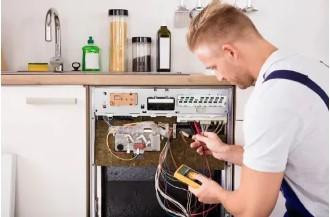A dishwasher is an indispensable appliance in many households, making the post-meal cleanup process much more convenient. However, like all appliances, dishwashers can encounter issues and breakdowns over time. Instead of immediately reaching for a replacement, it's often cost-effective to explore dishwasher repair options. In this guide, we'll walk you through common dishwasher problems, troubleshooting techniques, and maintenance tips to help you keep your dishwasher running efficiently.
Common Dishwasher Problems
Dishwasher Doesn't Start
If your dishwasher doesn't start, check whether it's properly plugged into the electrical outlet and if there's power in the outlet. You should also verify that the door is securely latched, as many dishwashers won't operate unless the door is closed and locked.
Water Doesn't Fill or Drains Slowly
A common issue is when the dishwasher fails to fill with water or drains slowly. This may be due to a clogged water inlet valve or a malfunctioning float switch. The float switch monitors the water level in the dishwasher, and if it's stuck or damaged, it can disrupt the water supply.
Water Leakage
Water leakage can occur due to several reasons, such as a worn-out door gasket, a damaged hose, or a malfunctioning pump. Inspect the door gasket for signs of wear and tear, and ensure it's properly seated. If you notice a damaged hose, it may need to be replaced.
Dishes Don't Get Clean
If your dishwasher isn't cleaning dishes effectively, it could be due to a clogged spray arm, a worn-out spray arm bearing, or a malfunctioning pump. Inspect the spray arms for debris and mineral buildup, and clean them if necessary. Also, check the spray arm bearing and replace it if it's damaged.
Dishwasher is Noisy
Unusual noises during a dishwasher cycle can be attributed to issues with the pump, motor, or spray arm. Inspect these components for any foreign objects that might be causing the noise. If the problem persists, you may need to replace the faulty part.
Soap Dispenser Doesn't Open
If the soap dispenser doesn't open during the wash cycle, it may be due to a defective timer, bi-metal release, or wax motor. Test these components to identify the faulty part and replace it as needed.
Troubleshooting and Repair
Safety First
Before performing any dishwasher repair or maintenance, ensure your safety. Always unplug the dishwasher or turn off the power at the circuit breaker. Use caution when handling sharp objects, hot water, or electrical components.
Consult the User Manual
Your dishwasher's user manual is an invaluable resource. It provides troubleshooting guidelines specific to your model. Refer to the manual for information on how to diagnose and address common issues.
Check for Blockages
A common cause of dishwasher problems is blockages in the drain, spray arms, and filters. Carefully inspect these areas for any debris or mineral buildup. Clean them thoroughly to ensure efficient water circulation and drainage.
Test the Float Switch
The float switch, located at the bottom of the dishwasher, is responsible for monitoring water levels. Ensure it moves freely and isn't stuck. A malfunctioning float switch may prevent your dishwasher from filling with water.
Examine the Door Gasket
If you're experiencing water leakage, inspect the door gasket for any visible damage or wear. Replace the gasket if it's damaged or no longer sealing properly.
Replace Faulty Components
If you've identified a specific faulty component, such as a malfunctioning pump, motor, or timer, consider replacing it. Dishwasher parts are often readily available and relatively easy to install with basic tools.
Maintenance Tips
Regular Cleaning
Regularly clean your dishwasher by running a cycle with an empty dishwasher and a cup of white vinegar. This helps remove mineral deposits and soap scum. Additionally, wipe down the interior, spray arms, and door gasket to prevent debris buildup.
Maintain the Filters
Clean and maintain the dishwasher's filters as per the manufacturer's instructions. Clogged filters can affect the machine's performance.
Use Quality Detergent
Invest in high-quality dishwasher detergent, as subpar detergents can leave residues and affect cleaning efficiency.
Proper Loading
Load the dishwasher properly to ensure efficient water circulation and cleaning. Avoid overcrowding and make sure dishes are not blocking the spray arms.
Regular Inspection
Periodically inspect the hoses and connections for any signs of wear or damage. Ensure they are securely attached to prevent water leakage.
Check for Loose Screws
Over time, screws and fasteners may become loose due to vibrations. Regularly inspect and tighten any loose components to prevent unwanted noise or other issues.
For More Info:-
Appliance installation Toronto






Comments